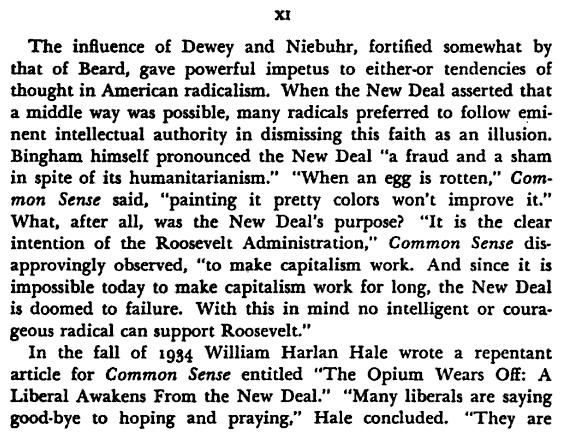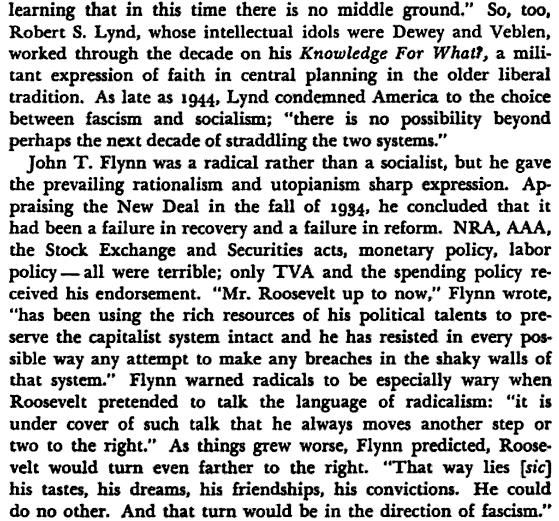General Discussion
Related: Editorials & Other Articles, Issue Forums, Alliance Forums, Region ForumsAn Incoherent Harper's Essay Suggests There's No Difference Between Obama and Republicans
Left-wing naivete about right-wing radicalism
BY MIKE KONCZAL
A Democratic president’s economic agenda is a failure, lost to business class acquiescence, the embrace of austerity, and an overall lack of vision.
This was the conclusion of The New Republic, summarizing Franklin Delano Roosevelt and the New Deal in May 1940. Though there were “extraordinary accomplishments” to acknowledge, the magazine understood that the New Deal was a “failure in the central problem.” That central problem was the economic question, and there, the Roosevelt administration had “fail[ed] to discover or apply a genuine remedy for the stagnation of our economy and for unemployment.” Beyond the failure of vision, it “heeded business advice, at least in part, by trying to cut recovery expenditures” and engage in other forms of austerity...In other words, being disappointed in Democratic presidents is what opinion editors refer to as “evergreen” content. It’s always ready to go, and always applicable with a built-in audience. With this in mind, political scientist Adolph Reed has a cover story in the latest Harper’s, Nothing Left (ungated), making the case against President Obama and for the idea that liberalism is currently exhausted.
Much of the text is focused on the well-rehearsed argument that President Obama is much more conservative than people understand...But Reed is making an argument that goes beyond the current Democratic Party, and there are three points worth exploring further.
Reed: “With the two parties converging in policy…”
This is the kind of stuff that drives liberals up the wall, and for good reason. The two parties at this point are pushing two very different, ideological visions of the role of the state and the market. Ignore, for a second, cuts and expansions. Conservatives want to privatize Social Security, while liberals want it to remain a public program. Conservatives want to turn Medicare into a coupon to buy health insurance on exchanges, while liberals want to use Medicare’s footprint to control health-care costs. Liberals see a greater role for the federal government, for instance in absorbing the costs of a major expansion of Medicaid. Conservatives want to turn everything over to the states where it will be easier to starve and replace with private control. These aren’t minor differences...States taken over by conservatives have waged an all-out war on workers, reproductive health, and public goods. Meanwhile liberal states and cities have moved to expand paid sick-leave, minimum wages, and reproductive health. Even the so-called culture wars have a hard economic edge. Reed dismisses feminism as a set of fake cultural politics. Yet health-care reform has eliminated “woman” as a pre-existing condition, and minimum wage hikes, which disproportionately benefit women of color, and equal pay are in the forefront.
<...>
Reed: “....the areas of fundamental disagreements that separate (the two parties) become too arcane and too remote from most people’s experience to inspire any commitment, much less popular action.”
No. Just a casual glance out the window shows that the differences in policy have created massive popular actions. From the Tea Party organizing against expanding access to health-care and efforts to fight the recession, to undocumented workers organizing to pass immigration reform, the actual differences in play get people on the street.
There’s a genuine issue here for liberals. One positive thing that the New Republic saw in the New Deal back in 1940 was the idea that the changes in social insurance and labor laws were self-enforcing, and that “it is improbable that these more permanent changes will be or even can be destroyed by any new administration.” (They were half-right; labor was decimated seven years later under Taft-Hartley.)
- more -
http://www.newrepublic.com/article/116962/adolph-reeds-harpers-essay-about-obama-naive-about-tea-party
ProSense
(116,464 posts)tell the effectiveness of a President by the caliber and determination of his critics.
http://www.rooseveltinstitute.org/policy-and-ideasroosevelt-historyfdr/new-deal


<...>


http://books.google.com/books?id=vC5HJloBWugC&lpg=PP1&pg=PA159#v=onepage&q&f=false
Bedrock Consumer Protections Once Were Flogged as ‘Exceedingly Dangerous,’ ‘Monstrous Systems’ That Would ‘Cripple’ the Economy
WASHINGTON, D.C. – As the nation approaches the first anniversary of the Dodd-Frank financial reform law, opponents are claiming that the new measure is extraordinarily damaging, especially to Main Street. But industry’s alarmist rhetoric bears striking resemblance to the last time it faced sweeping new safeguards: during the New Deal reforms. The parallels between the language used both then and now are detailed in a report released today by Public Citizen and the Cry Wolf Project.
In the decades since the Great Depression, Americans acknowledged the necessity of having safeguards in place to prevent another crash of the financial markets, including the creation of the Federal Deposit Insurance Corporation (FDIC) and the Securities and Exchange Commission (SEC), and laws requiring public companies to accurately disclose their financial affairs. Although these are now seen as bedrock protections when they were first introduced, Wall Street cried foul, the new report, “Industry Repeats Itself: The Financial Reform Fight,” found.
“The business community’s wildly inaccurate forecasts about the New Deal reforms devalue the credibility of the ominous predictions they are making today,” said Taylor Lincoln, research director of Public Citizen’s Congress Watch division and author of the report. “If history comes close to repeating itself, industry is going to look very silly for its hand-wringing over Dodd-Frank when people look back.”
<...>
In fact, the Dodd-Frank Wall Street Reform and Consumer Protection Act is designed to prevent another Wall Street crash, which really made it tough on everyone by causing massive job loss and severely hurting corner butchers and bakers, as well as retirees, families with mortgages and others. The Dodd-Frank law increases transparency (particularly in derivatives markets); creates a new Consumer Financial Protection Bureau to ensure that consumers receive straightforward information about financial products and to police abusive practices; improves corporate governance; increases capital requirements for banks; deters particularly large financial institutions from providing incentives for employees to take undue risks; and gives the government the ability to take failed investment institutions into receivership, similar to the FDIC’s authority regarding commercial banks. Much of it has yet to be implemented.
- more -
http://www.commondreams.org/newswire/2011/07/12-0
Elizabeth Warren:
http://www.warren.senate.gov/files/documents/AFR%20Roosevelt%20Institute%20Speech%202013-11-12.pdf
ProSense
(116,464 posts)"When will America be ready to elect a progressive president running on a progressive agenda?
My response: Never
Congress will never be 100 percent progressive and the ankle biting of any President will continue.
In Obama's case, people on both sides seem to believe he was elected King, one side expecting him to act that way, and the other pretending he's acting that way.
If Congress had been more progressive, even in 2009, there would have been a lot more advancement of a more progressive agenda.
In 2009, if there were no Blue Dogs/DLCers in the House and Senate, there would have been a public option and quicker path to single payer. There would have been a climate change bill, creating millions of jobs and upgrading the infrastructure.
Unfortunately, the House is now in Republicans' hands. Unless there is significant change, in 2016 anyone elected President is going to be dealing with a right-leaning Congress.
If the President-elect is a progressive, he/she will spend the time giving pretty speeches and will have less to show for it because the expectations will be even higher.
http://www.democraticunderground.com/10024649592#post9